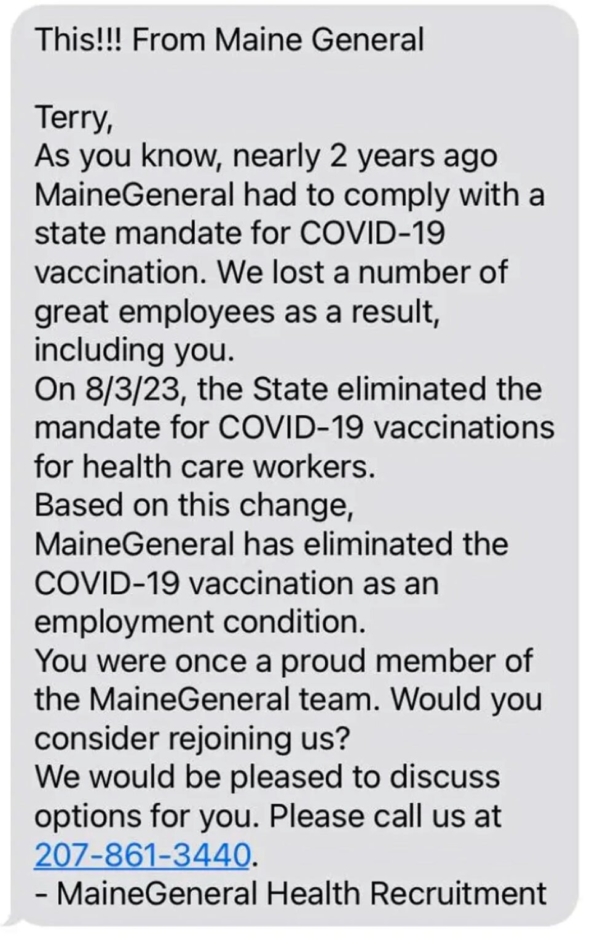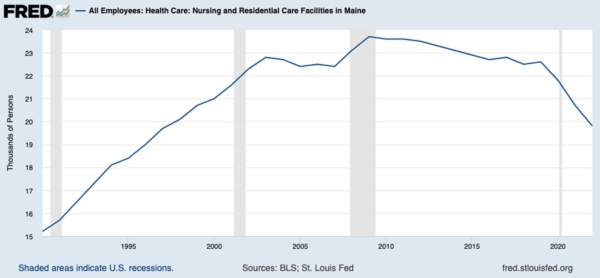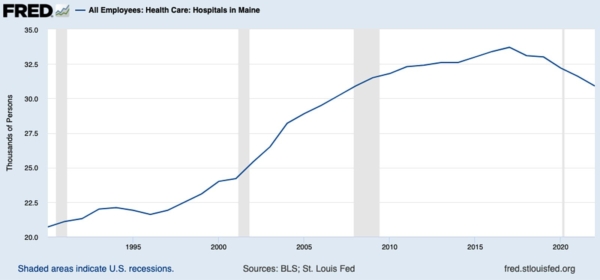
This article was originally re-published by The Defender—Children’s Health Defense’s News & Views Website
Nurses and other health care workers at MaineGeneral Health, one of Maine’s largest health care providers, were unceremoniously fired two years ago if they refused to take the experimental mRNA injections touted as COVID-19 preventatives.
Some of those workers were even slapped with misconduct charges for refusing to comply with the mandate, many were later denied unemployment benefits, and no requests for religious exemptions were honored.
Now, one of the nonprofit hospitals that left some employees jobless and without recourse to Maine’s unemployment insurance benefits is sending text messages to the same employees it cast aside practically begging them to come back to work.
“You were once a proud member of the MaineGeneral team. Would you consider rejoining us? We would be pleased to discuss options with you,” the MaineGeneral Health Recruitment team said in a text message to former registered nurse Terry Poland.
“As you know, nearly 2 years ago MaineGeneral had to comply with a state mandate for COVID-19 vaccination. We lost a number of great employees as a result, including you,” MaineGeneral said.
“MaineGeneral has eliminated the COVID-19 vaccination as an employment condition,” MaineGeneral said.
Poland, who lives in Augusta, had worked as a registered nurse for 33 years. Her career included employment with MaineGeneral, Central Maine Medical Center, Pen Bay Medical Center, and the Aroostook Medical Center.
She couldn’t believe that the hospital would contact her in such a manner after casting her life into chaos for nearly two years.
“I was livid. Like, how dare you force me out of a career that I’ve dedicated my whole life to, taken away my livelihood, my ability to earn a good income, and now you think I’m gonna come grovel back to you?” Poland said.
Poland continued:
“I don’t hardly think so. And that’s the attitude of most everybody that I’ve been in contact with since yesterday.”
A source told the Maine Wire that about 15 former MaineGeneral Health employees received similar text messages.
Poland refused to take the experimental COVID-19 shots after Gov. Janet Mills decreed on Aug. 12, 2021, that health care workers would be forced to receive the shots as a condition of working in health care by Oct. 1, 2021.
Documents reviewed by the Maine Wire show that MaineGeneral established a speedier timeline of Sept. 17 for compliance.
Eventually, the state pushed back the deadline to the end of October.
Poland was never opposed to vaccines generally speaking.
Though she previously used a religious exemption to avoid taking an influenza shot, she willingly took the other vaccines required to work in health care prior to the COVID-19 pandemic, including immunizations for measles, mumps, rubella, and hepatitis B.
She said she was concerned about the novel nature of the mRNA technology, a form of gene therapy, which prior to COVID-19 had not been used in the standard schedule of immunizations.
“I knew enough not to take it. I’ve been a nurse long enough to know I need to question what new products are,” Poland said. “I’m not going to be the first one to jump on board of an experiment.”
When she discovered that fetal tissues are commonly used in the development and production of the drugs, that only strengthened her resolve as a Christian not to get the injections.
In previous years, Poland has said she was allowed an exemption from taking the influenza shot so long as she wore a mask during flu season. However, the hospital was unwilling to provide this accommodation for COVID-19.
As a result of her choice, Poland faced not only termination but also an allegation of misconduct from her former employer.
When she applied for unemployment benefits, she was rejected because of the misconduct allegation.
When she appealed, she was turned away.
Documents reviewed by the Maine Wire show that the Maine Department of Labor determined that MaineGeneral Health “discharged” her; however, the agency concluded that Poland’s refusal to get the injections was a violation that constituted a “culpable breach of obligations to the employer.”
As a result, Poland had to rely on her savings to get by in the middle of economically disastrous government lockdowns and soaring inflation.
Poland then sought help from the federal Equal Employment Opportunity Commission, claiming that she’d been discriminated against on the basis of her religious beliefs.
MaineGeneral Health, in responding to the commission, argued that allowing Poland religious accommodations would impose an “undue hardship” on the hospital. On that basis, the commission declined to take on her case.
The Maine Human Rights Commission also rejected her discrimination complaint.
“[T]here has been positive energy between human resource personnel and managers who are in the process of working together to reach out to former employees to see if they are interested in returning,” said Joy McKenna, director of communications for MaineGeneral, in an email.
“Since Monday, we are only aware of a few people who have indicated that they are interested in having a conversation about applying for an open position,” she said. “We currently have 453 open positions, which is similar to our pre-COVID open position count.”
McKenna said the hospital did not intentionally fire unvaccinated employees in a way that would block them from getting unemployment benefits.
Some of those positions have been filled by foreign nationals with green cards, McKenna said, though she was not able to provide an exact number on Aug. 9.
At the time MaineGeneral fired her, Poland was working at the MaineGeneral Rehabilitation and Long Term Care at Gray Birch facility in Augusta.
The facility provides nursing home and assisted living services and has a 37-bed capacity. Federal stats show the facility had 141 staff before the mandate and 110 after it was enforced.
In the years since she was fired, she estimates she’s earned only $12,000 and $17,000 as a home health care worker, a position that hasn’t provided similar benefits to the job she lost.
As a registered nurse, Poland was making about $75,000 per year.
She’s still not willing to give MaineGeneral another shot.
Poland is not the only one whose career was derailed by Mills’ mandate policy.
Jessie Boda worked for St. Mary’s Health System as a registered nurse in psychiatric and detox services for 13 years, her first job out of college.
When the mandate came down, she applied for a religious exemption.
In her letter requesting the exemption, Boda pointed to her religious faith and her concern over adverse vaccine reactions.
She also pointed out that natural immunity from a COVID-19 infection was in some cases a better protection against contracting the virus.
St. Mary’s, which has a formal affiliation with the Catholic church, denied the request.
Like MaineGeneral, St. Mary’s also found a way for Boda’s exit from the company to prevent her from getting unemployment benefits.
“I did not comply and I never submitted a letter of resignation. Nor would they give me a letter of termination,” Boda said.
“The kind lady in the HR office gave me a letter stating my start date and end date of employment but told me she could not use the words ‘terminated’ or ‘fired’,” she said.
Boda took her case to the Equal Employment Opportunity Commission, which agreed to investigate her case but concluded there were no grounds for the complaint.
Kevin Palmer worked as a credentialing coordinator for Southern Maine Health Care, the Biddeford location of MaineHealth.
Palmer, who is in his 30s, was never opposed to taking vaccines before COVID-19, but he was skeptical of what he saw as a rushed process to roll out the COVID-19 shots.
“I had heart surgery in high school, survived brain cancer in my 20s, and now they’re telling me I have to get this shot over a virus with a 99.99 percent survival rate?” he said.
Like Boda and Poland, Palmer sought a religious exemption and was denied.
Like Boda and Poland, Palmer was fired in a way that later prevented him from obtaining unemployment.
In his termination letter, the HR department wrote:
“This is also to confirm that September 30 will be your last day of employment. We want to thank you for your service.”
Even though the hospital gave him an employment date in an email, the Maine Department of Labor ruled against him.
“I never got a penny,” Palmer said.
He wasn’t able to find another job until four months later and the job he eventually found came with a 20 percent pay cut.
“I ran out of money like everybody else. It was crazy. I was trying to apply to jobs, similar to what I had done in credentialing. And I couldn’t even get a job with the experience I had because they were mandating the vaccine even for remote positions,” said Palmer.
“How crazy is that?” he said.
A Health Care Worker Crisis Caused by Authoritarian Policies
Thousands of former health care workers in Maine are currently unemployed or working in other fields because they refused to comply with Mills’ order that they receive injections.
Some refused because they were skeptical of all vaccines or because of religious beliefs concerning the ethical problems with vaccine research that uses fetal tissue.
Others were fearful that the long-term consequences of the experimental products were unknown, unknowable, and potentially harmful.
But in every case, the substantial drop in employment in Maine’s health care sector because of the mandate has severely exacerbated a workforce shortage that threatens to undermine health care quality in the state.
Text messages like the one Poland received will hardly fix the problem.
It’s virtually impossible to determine how much of the sharp drop in health care employment has been caused by Mills’ order, how much of it was caused by COVID-19, and how much of it was caused by lockdown policies generally.
Regardless, labor statistics show Maine is in the middle of the steepest decline in health care jobs. Ever.
According to stats from the U.S. Bureau of Labor Statistics, those losses have been particularly acute in Maine’s nursing homes and assisted living facilities, like the facility where Poland worked.
In 2019, Maine had more than 22,600 individuals employed at nursing homes.
That number hit 19,800 in 2022.
At skilled nursing facilities, employment dropped from 8,426 in 2019 to 6,907 in 2022, according to Maine Department of Labor statistics.
The shortage of long-term care workers is all the more severe in Maine since the state consistently ranks as the oldest in the nation. As demand for nursing home beds increases, the number of workers available to provide that care has plummeted.
In home health care, total employment has declined from 4,401 workers in 2019 to 4,054 in 2022.
The same shortage can be seen in employment figures for hospitals in Maine. Mainers working in Maine hospitals declined from 33,000 in 2019 to 30,900 in 2021, according to federal statistics.
Even as Maine’s opioid epidemic has continued to break records for overdoses and deaths, the number of people employed in the health sector that includes substance abuse facilities has declined from 7,509 workers in 2019 to 7,149 in 2022, according to the Maine Department of Labor numbers.
One health care area that hasn’t seen such sharp declines is ambulatory health care, which includes facilities that are out-patient only, such as urgent care clinics and dentists’ offices.
At the same time the medical field is suffering from a lack of employees, Mainers have never spent more money on their health care.
Personal consumption of outpatient and in-home care neared $11.9 billion in 2021, according to the U.S. Bureau of Economic Analysis. That’s a massive increase over the $11.2 billion reported for 2019.
At least some of that money is making its way into the pockets of Maine’s remaining health care workers. According to federal stats, Mainers who work in health care or social assistance made a record $7,028,362,000 in collective wages—the highest ever in Maine history.
Vaccine Mandate Victims Seek Discrimination Case
Mills’ mandate was based on the theory that the pharmaceutical products being touted as “vaccines” or “immunizations” would prevent health care workers from contracting the virus or transmitting it to patients.
It’s now generally understood that the vaccine never inhibited transmission of the virus.
Mills, who has followed the recommended injection schedule, has herself caught COVID-19 twice despite getting the jabs.
The Aug. 3 decision by the Mills administration to rescind the mandate after nearly two years following on the heels of an embarrassing legal defeat in a case challenging the constitutionality of Mills’ decision to eliminate religious and philosophical exemptions from the mandate.
That court case hinges on the fact that Mills continued to allow medical exemptions while denying a comparable exemption for medical reasons.
Although the plaintiffs in that case, several health care workers who lost their jobs over the mandate, initially lost in Maine District Court, an appeals court panel has determined that the lower court erred when it rejected their claim of religious discrimination.
In May, when that decision came down, Matt Staver, who represents the plaintiffs via Liberty Counsel, said he was looking forward to discovery.
“We’re frankly looking very much forward to going to discovery and holding Governor Mills and the Maine authorities accountable for this terrible and, frankly, unconstitutional decision,” said Staver.
Originally published by The Maine Wire, reposted by The Defender—Children’s Health Defense’s News & Views Website under Creative Commons license CC BY-NC-ND 4.0. Please consider subscribing to The Defender or donating to Children’s Health Defense.




No comments:
Post a Comment